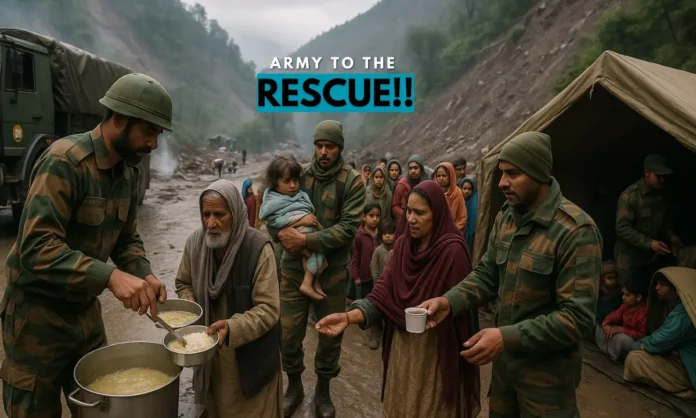SUMMARY
- Army swiftly launched relief operations after landslides and flash floods stranded hundreds on NH-44 near Ramban.
- Eight Army Quick Reaction Teams provided food, shelter, and medical aid to distressed travellers.
- Rescue efforts continue amid road closures; schools across Kashmir Valley shut due to severe weather.
“Koi Dikkat Nahi Hai… Army Hai Na”: Army’s Swift Action Saves Lives in Rain-Hit Ramban
Banihal, April 21 – In a powerful display of rapid humanitarian response, the Indian Army rushed to aid hundreds of civilians stranded along the Jammu–Srinagar National Highway (NH-44) following intense rainfall, a cloudburst, and multiple landslides in the Ramban district of Jammu & Kashmir.
Passengers—many of them women, children, and elderly individuals—were left vulnerable, hungry, and without shelter or medical help after the highway was rendered impassable. Responding without delay, the Army deployed Quick Reaction Teams (QRTs) from Banihal, Karachial, Digdaul, Maitra, and Chanderkote. Within hours, hot meals, tea, clean water, first aid, and temporary shelters were being distributed and set up across affected areas.
One relieved passenger summed up the public sentiment with a confident smile: “Koi dikkat nahi hai… Army hai na… Sab kuchh theek ho jaayega.” (“There’s no problem… The Army is here… Everything will be fine.”)
Jai Hind ki Sena 🇮🇳
— Maj Gen Raju Chauhan, VSM (veteran)🇮🇳 (@SoldierNationF1) April 21, 2025
Indian Army taking care of citizens stuck at Ramban on Jammu Srinagar highway pic.twitter.com/9sk6dy437J
Disaster Strikes: Cloudburst and Landslides Cause Death and Displacement
- Heavy rain triggered landslides and flash floods in Ramban’s Bagahana village, killing three people, including two children.
- Multiple homes collapsed, and several areas remain under threat of fresh slides.
- Officials estimate that full road clearance may take up to 48 hours.
The cloudburst in the early hours of April 21 caused widespread destruction in remote regions of Ramban. Local civil authorities, including the District Commissioner, SSP, and Superintendent of Traffic, coordinated closely with the Army to assess risks and deploy relief as needed.
Despite no formal emergency requisition being made yet, eight Army columns remain on standby across key locations to assist further. The Army’s proactive approach has not only helped contain the crisis but also bolstered civilian morale.
Restoring Connectivity: Joint Efforts Underway on NH-44
- Civilian construction giants KRCL, CPPL, and DMR have mobilized JCBs and heavy equipment for highway clearance.
- NH-44, the lifeline of Kashmir, remains blocked in several locations due to debris and flooding.
- Restoration could take up to two days, depending on weather conditions.
NH-44 is a strategic arterial route linking Jammu and Srinagar, essential not just for passenger travel but also for transporting food, fuel, and military logistics to the Kashmir Valley. The combined civil-military operation aims to ensure quick reopening of the highway, though intermittent rain and fresh slide risks continue to pose challenges.
Traffic police have urged the public to avoid unnecessary travel and cooperate with authorities. Meanwhile, Army troops are also helping clear smaller roadblocks and stabilizing at-risk zones to prevent secondary disasters.
Schools Closed Across Kashmir Valley as Weather Worsens
- All schools shut on April 21 across Kashmir, announced Education Minister Sakina Itoo.
- The order comes amid forecasts of continued rainfall, flash floods, and landslides.
- Safety of children and transport constraints cited as key reasons.
As weather reports warn of more heavy precipitation in coming days, the J&K administration has decided to suspend classwork across the Valley, especially in vulnerable districts like Anantnag, Kupwara, Baramulla, and Pulwama. The Education Department is monitoring the situation closely and will issue a fresh advisory depending on conditions.
Army’s Role Beyond Borders: Faith and Service in Action
The operation has again showcased the Indian Army’s enduring ethos of ‘Seva Parmo Dharma’ (Service Before Self). Whether in combat or catastrophe, the force remains a pillar of support for civilians in crisis zones. Acts like these also strengthen civil–military relations, building trust and goodwill across the region.
With the current weather system expected to linger over the next 48–72 hours, the Army’s readiness, coordination with local authorities, and ability to mobilize relief at scale could prove critical in preventing a humanitarian emergency.


